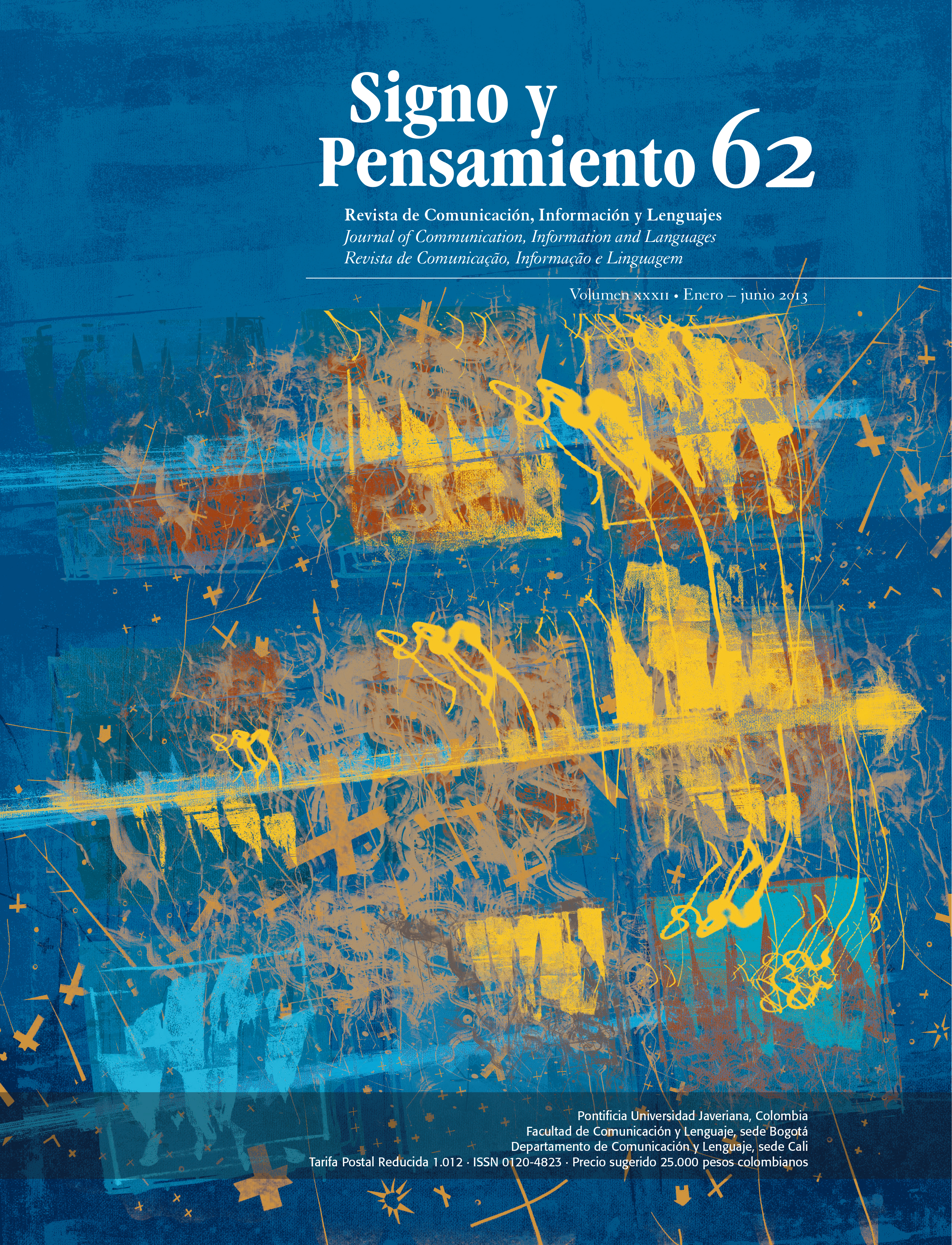Resumen
En este artículo se estudian los rasgos del insulto político como acto de habla recurrente en los foros de los lectores de la prensa digital colombiana, su articulación con la función estratégica de deslegitimación del oponente, propia del discurso político, y sus vínculos con la cultura política autoritaria predominante en el país —así como su empleo por parte de usuarios que se adscriben a otras culturas políticas—, en los contextos de polarización característicos de la coyuntura electoral del 30 de octubre de 2011, en Colombia. El corpus textual se conformó con 1.260 comentarios de lectores, recolectados de los foros de cuatro columnistas de eltiempo.com y tres columnistas de elespectador.com, durante un lapso de seis semanas. Se examinaron cuatro metáforas referidas a la caracterización del foro de los lectores: como cloaca, cuadrilátero, diálogo racional o galería de espejos múltiples.
Austin, J. (1981). Cómo hacer cosas con palabras. Palabras y acciones. Barcelona: Paidós.
Bolívar, A. (2005). La descortesía en la dinámica social y política. En Actas del II Coloquio Internacional del programa EDICE. Actos de habla y cortesía en distintas variedades del español: perspectivas teóricas y metodológicas (pp.137-164). Estocolmo y Costa Rica: Programa EDICE, Universidad de Costa Rica, Universidad de Estocolmo.
Bolívar, A. (2008). “Cachorro del imperio” versus “Cachorro de Fidel”: los insultos en la política latinoamericana. Discurso & Sociedad, 2 (1), 1-38.
Bourdieu, P. (2001). ¿Qué significa hablar? Madrid: Ediciones Akal.
Cabrera Paz, J. (2009). Convergencias: tecnologías del contacto. En Varios, Pensar lo contemporáneo: de la cultura situada a la convergencia tecnológica (pp. 263-276). México: Anthropos-UAM.
Chilton, P., & Schaffner, C. (2000). Discurso y política. En T. A. Van Dijk (Ed.), El discurso como interacción social. Estudios sobre el discurso (Vol. II, pp. 297-329). Barcelona: Gedisa.
Gutiérrez Girardot, R. (1986). Universidad y sociedad. Argumentos (14/15, 16/17), 63-76.
Habermas, J. (1997). Historia y crítica de la opinión pública. La transformación estructural de la vida pública (5a ed.). Barcelona: G. Gili.
Landi, O. (1998). Reconstrucciones: las nuevas formas de la cultura política. Buenos Aires: Punto Sur.
Landi, O. (2000). Sobre lenguajes, identidades y ciudadanías políticas. En N. Lechner (Ed.), Estado y Política en América Latina (7a ed., pp. 172-198). México: Siglo XXI Editores.
Mancera Rueda, A. (2009). Manifestaciones de descortesía y violencia verbal en los foros de opinión digitales de los diarios españoles. Discurso & Sociedad, 3 (3), 437-466.
Perelman, C., & Olbrechts-Tyteca, L. (1989). Tratado de la argumentación. La nueva retórica. Madrid: Gredos.
Ruiz, C., Masip, P., Mico, J. L., et al. (2010). Conversación 2.0 y democracia. Análisis de los comentarios de los lectores en la prensa digital catalana. Comunicación y Sociedad, 23 (2), 7-39.
Searle, J. (1980). Actos de habla. Madrid: Cátedra. Toulmin, S. (2007). Los usos de la argumentación. Barcelona: Ediciones Península.
Van Dijk, T. (2003). Ideología y Discurso. Barcelona: Ariel Lingüística.
Van Dijk, T. (2005). Política, ideología y discurso. Quórum Académico, 2 (2), 15-47.
Esta revista científica se encuentra registrada bajo la licencia Creative Commons Reconocimiento 4.0 Internacional. Por lo tanto, esta obra se puede reproducir, distribuir y comunicar públicamente en formato digital, siempre que se reconozca el nombre de los autores y a la Pontificia Universidad Javeriana. Se permite citar, adaptar, transformar, autoarchivar, republicar y crear a partir del material, para cualquier finalidad (incluso comercial), siempre que se reconozca adecuadamente la autoría, se proporcione un enlace a la obra original y se indique si se han realizado cambios. La Pontificia Universidad Javeriana no retiene los derechos sobre las obras publicadas y los contenidos son responsabilidad exclusiva de los autores, quienes conservan sus derechos morales, intelectuales, de privacidad y publicidad.
El aval sobre la intervención de la obra (revisión, corrección de estilo, traducción, diagramación) y su posterior divulgación se otorga mediante una licencia de uso y no a través de una cesión de derechos, lo que representa que la revista y la Pontificia Universidad Javeriana se eximen de cualquier responsabilidad que se pueda derivar de una mala práctica ética por parte de los autores. En consecuencia de la protección brindada por la licencia de uso, la revista no se encuentra en la obligación de publicar retractaciones o modificar la información ya publicada, a no ser que la errata surja del proceso de gestión editorial. La publicación de contenidos en esta revista no representa regalías para los contribuyentes.


